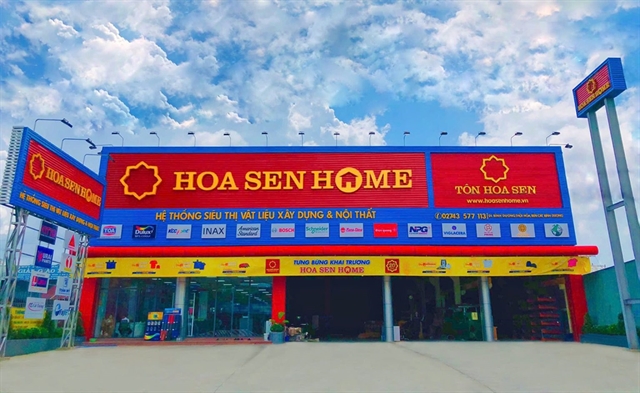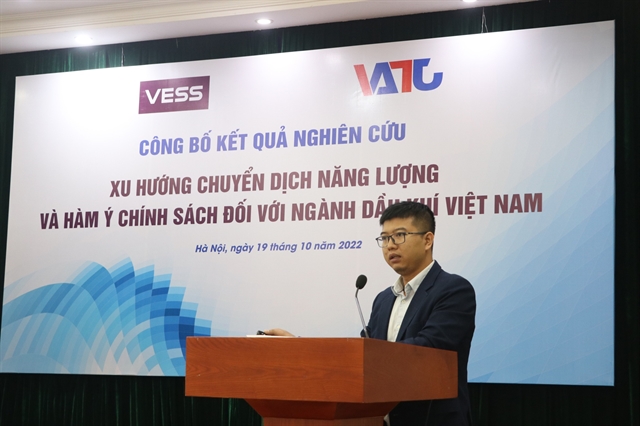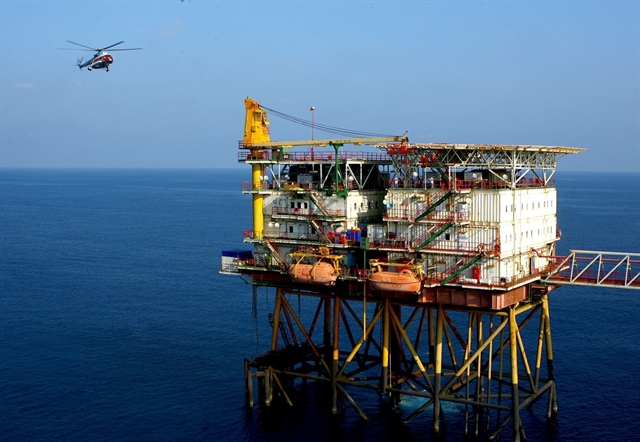 Economy
Economy


|
| Phạm Văn Long of the VESS delivers a speech at the event. — VNS Photo |
HÀ NỘI — The energy transition brings many opportunities for industries, but it also poses great challenges, particular in fossil fuel extraction and processing, according to industry insiders.
They made the comment at an event to announce results of a research on the energy transition trends and policy implications for Việt Nam’s oil and gas industry conducted by the Vietnam Center for Economic and Strategic Studies (VESS) on Wednesday in Hà Nội.
Speaking at the event, Phạm Văn Long of the VESS told participants that last year, Việt Nam ranked 61 out of 115 countries in terms of readiness for energy transition.
He said energy sectors such as electricity and transport tend to change rapidly in response to Việt Nam's commitment to reducing greenhouse gas emissions. The domestic oil and gas industry, which is the key supplier of fuels for all domestic industries, has also faced opportunities and challenges amid the global energy transition.
Long said: “The local oil and gas industry has been coping with challenges, but there are also new opportunities, if it knows how to effectively and appropriately enforce policies. This move will help Việt Nam’s oil and gas industry successfully transform."
Currently, Việt Nam's oil and gas industry is facing an extremely difficult situation in raising oil reserves to compensate for annual production. In addition, investment in oil and gas exploration remains poor due to high costs and risks. Meanwhile, policies conducted to minimise the use of fossil fuels will create more barriers to the development of the oil industry.
Inadequacies
According to Long, the draft revised Law on Petroleum is expected to create opportunities and promote issues on investment, discovery, exploration and exploitation of new oil and gas fields in a rapid and convenient manner, noting that the draft law now still has some shortcomings.
The revised draft Law on Petroleum stipulates activities for upstream oil and gas only, but does not regulate activities for middle and downstream oil and gas. This will cause conflicts and overlaps in the process of managing the oil and gas value chain.
The draft revised law has also proposed tax incentives for investors who can enjoy a reduction of corporate income tax rate from 25 per cent to 50 per cent. Over the past 10 years, ASEAN member countries are in a race to reduce corporate income tax rates. ASEAN’s average tax rate reduced from 25.1 per cent in 2010 to 21.7 per cent in 2020. That is the reason why Việt Nam's reduction of tax rate is said to be ineffective.
Moreover, the draft law does not contain legal provisions on settlement of disputes between Việt Nam and foreign investors. This will cause losses to the State budget. There are also no specific guidelines for the investigation, exploration and production of unconventional oil and gas.
Reposition
According to experts, gas is still considered an important factor to help gradually replace coal-fired power sources and support the transition from fossil fuels to renewable energy. They said a heavy reliance on imported liquefied natural gas (LNG) was not a sustainable solution for the country's energy transition.

|
| A view of Bạch Hổ (white tiger) oil rig offshore of Việt Nam. Việt Nam's oil and gas industry needs to boost exploitation of its potential oil and gas fields instead of maintaining the current output. — VNA/VNS Photo |
The National Power Development Plan VIII for the 2021-30 period with a vision to 2045 proposes that Việt Nam needs to join the LNG market with long-term contracts to avoid price fluctuations. Moreover, investment in specialised facilities for imported LNG requires large investment capital, while there are always high risks in operations.
Therefore, Việt Nam's oil and gas industry needs to boost exploitation of its potential oil and gas fields instead of maintaining the current output as proposed by the National Power Plan VIII.
Việt Nam is now in the process of energy transition with great potential in solar and wind power. The electricity generation from renewable sources creates significant changes in the demand for fossil fuels for the electricity industry. However, this transition has also posed challenges in power system operation. In addition, electrification has contributed to diversifying renewable energy.
Experts recommended that the oil and gas industry reposition itself in the entire energy production and supply chain with a long-term vision towards 2050. VNS